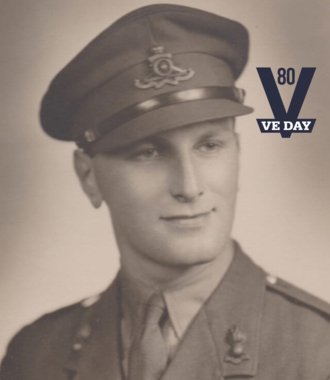
Born to Jewish parents in London in 1920, Leonard Berney (BCPS) joined the army immediately after school and became an officer.
At the age of 25 he was one of the first allied officers to enter the Nazi concentration camp Bergen-Belsen. Berney and his battalion stumbled upon the concentration camp completely by chance. As they were advancing on Berlin towards the end of the Second World War, two German soldiers hailed them down, waving white flags. Expecting to liberate what they thought was a POW camp, they came face-to-face with its many horrors instead.
Berney remained at Bergen-Belsen for 14 weeks, becoming the Commander of the Belsen Displaced Persons Camp and facing the immense challenge of trying to find food and medical care for 60,000 severely malnourished people. Berney was instrumental in creating the largest hospital the world had ever seen, with up to 15,000 beds to treat the sick.
At a ceremony on 27 April this year to mark the 80th anniversary of the liberation of Bergen-Belsen, Deputy Prime Minister, Angela Raynor quoted Leonard saying, “None of us who entered the camp that day had any warning of what we were about to see or had ever experienced anything remotely like it before. I remember being completely shattered.”
Leonard’s son John has spoken openly about how for many years, his father remained silent on the subject, until in his later years he became increasingly incensed by the pervasiveness of Holocaust Denial. He went on to write a book about the subject and campaign for better education.
Berney published the memoir, Liberating Belsen Concentration Camp – A Personal Account by (former) Lt-Colonel Leonard Berney in 2015 to mark the 70th anniversary of the end of the Holocaust. It emphasises the importance of the Universal Declaration of Human Rights, which was created in response to the Holocaust, and it gives hope that future atrocities can be prevented through human rights education.
John has stated, “Before 1945, people didn’t know about the Holocaust as we understand it now. The outside world did not believe initial reports from Belsen. Until people like my father saw what was going on, no one understood the true face of fascism.”
Lieutenant Colonel Leonard Berney died in 2016, aged 95. It is only fitting that on the 80th anniversary of VE Day, we remember his story, and the sacrifices made by so many to defeat fascism.
If you would like to read more about the efforts of Old Brightonians lost at war, the Brighton College Archive includes ‘Brighton College Remembers’, a microsite with a special Roll of Honour for the 173 OBs who lost their lives in the Second World War.
